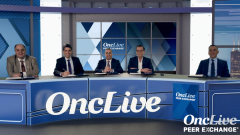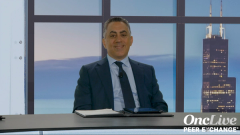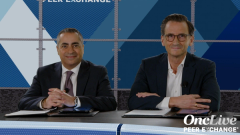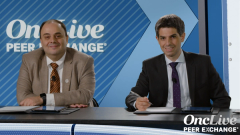
Frontline Therapy for Advanced HCC: Novel Combination Strategies
Before closing out their discussion on frontline therapy for advanced HCC, expert panelists review other novel combinations under investigation.
Episodes in this series

Transcript:
Tanios Bekaii-Saab, MD: Mark, I want you to close this. We've seen some data, and I know Arndt referred to that with COSMIC-312 [NCT03755791] with cabozantinib and [Atezolizumab] vssorafenib and 2 core primary end points which went in different directions, tell us more about this data and perhaps about other large studies that we hopefully will hear about soon.
Mark Yarchoan, MD: COSMIC-312 was a bit of a disappointment to many of us. This was a randomized trial of cabozantinib alone, vs cabozantinib plus atezolizumab, vs sorafenib, and the study was positive regarding PFS [progression- free survival] which was one of the co-primary end points, but missed the OS [overall survival] end point. The OS curves were at least overlapping with the sorafenib curves. I'm not quite sure what happened. Cabozantinib is a very active agent in HCC [hepatocellular carcinoma]. It's an agent that many of us use in second line HCC, where it performs very well. I don't know what happened, whether this was driven by crossover to other agents.
Tanios Bekaii-Saab, MD: The response rate was lower than one would expect.
Mark Yarchoan, MD: Yes, that's exactly where I was going. The response rate was 11% which numerically is lower than we've seen with PD-L1 monotherapy. Although the challenge here is that the sorafenib arm also had a very low response rate of 3.7%, or around there, which is lower than we've seen with other recent studies in a range of 15%. I don't know if the radiology was weird, if there was stage migration, treating a lot of patients who had TACE [transarterial chemoembolization] lesions that may be less likely to show true response. Overall, we have other agents that have shown OS benefit in the front line. The company, Exelixis, has announced that they're not planning to pursue a first line indication.
Tanios Bekaii-Saab, MD: Which is understandable.
Mark Yarchoan, MD: Very understandable from the data, we're waiting for a couple of other studies including the LEAP study which combines lenvatinib/pembrolizumab; we may have a TKI/IO [tyrosine kinase inhibitors/immuno-oncology] option. Also, apatinib plus camrelizumab is in a phase 3 that reportedly by press release is positive, but none of us have seen this data. I don't know if that will be an option in the US or not; so a lot to follow here.
Anthony El-Khoueiry, MD: And CHECKMATE-9DW [N CT04039607; nivolumab and ipilimumab]?
Tanios Bekaii-Saab, MD: Yes, if we're listing all the options. Anthony, how are we going to put this all together? They all look somewhat similar, some maybe more negative than others.
Anthony El-Khoueiry, MD: In a short algorithm. If I can summarize what we've discussed here is, if a patient is a candidate for IO and does not have contraindications to VEGF therapy they're going to get [atezolizumab plus bevacizumab]. If they have VEGF contraindications they're going to get [durvalumab/tremelimumab]. We have 2 nice combination options. If they're not a candidate for combination, maybe liver function weighing in, you can use single agent sorafenib, single-agent PD-1, PD-L1 and if they have IO contraindications they're going to get a TKI. With the new regimens that come on board we'll see the data and how positive or negative they are.
Tanios Bekaii-Saab, MD: It seems unlikely that any of those are going to displace the current standard, so as exciting as it is to see another phase three trial come through, I don't know if it's going to break that ceiling.
Transcript edited for clarity.








































